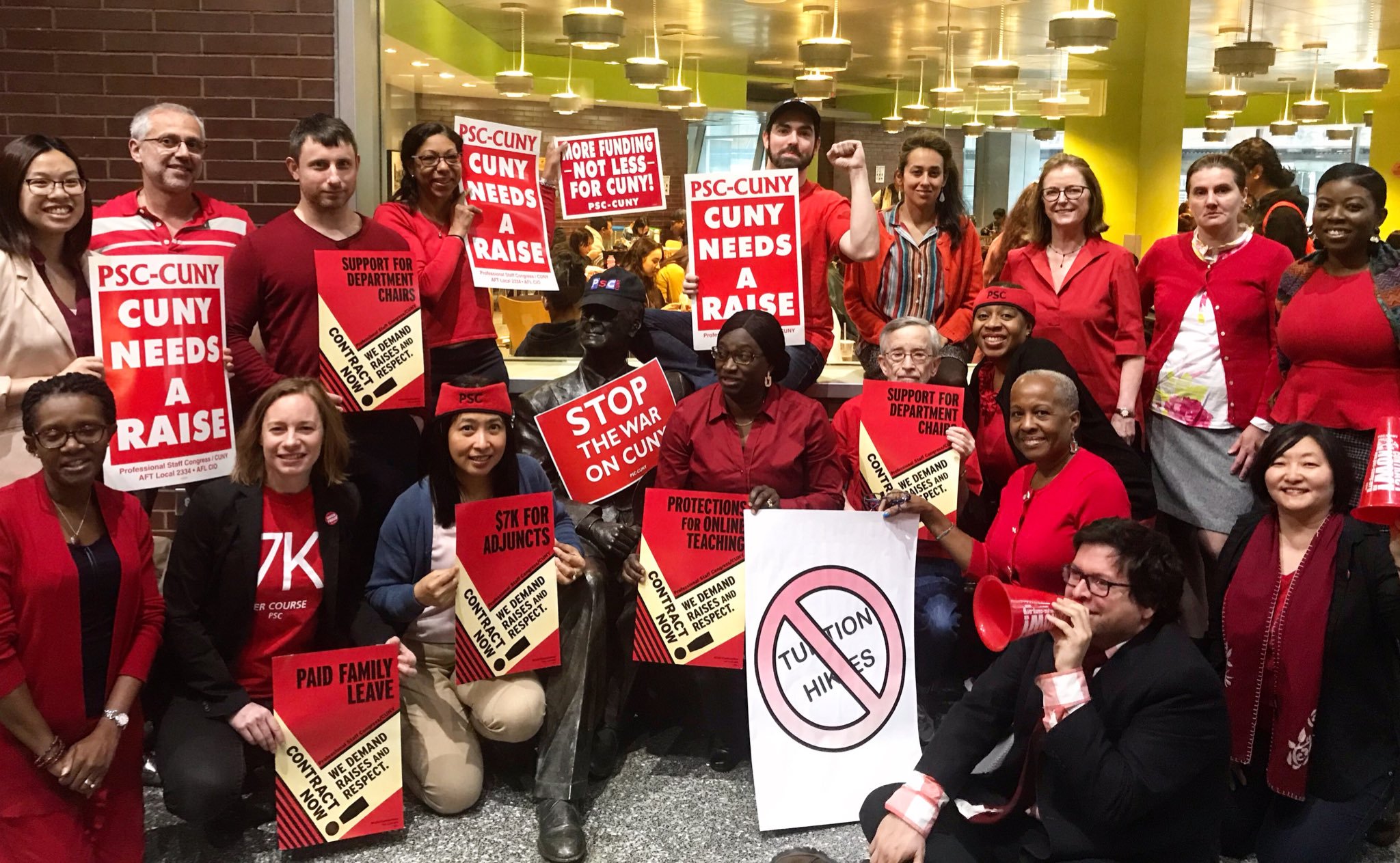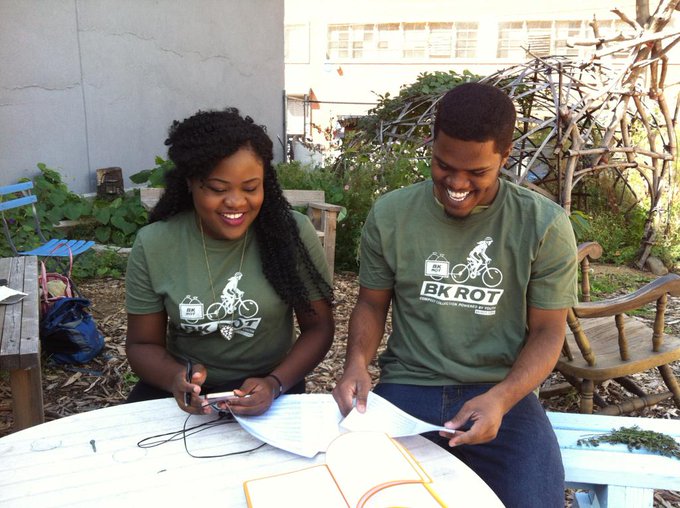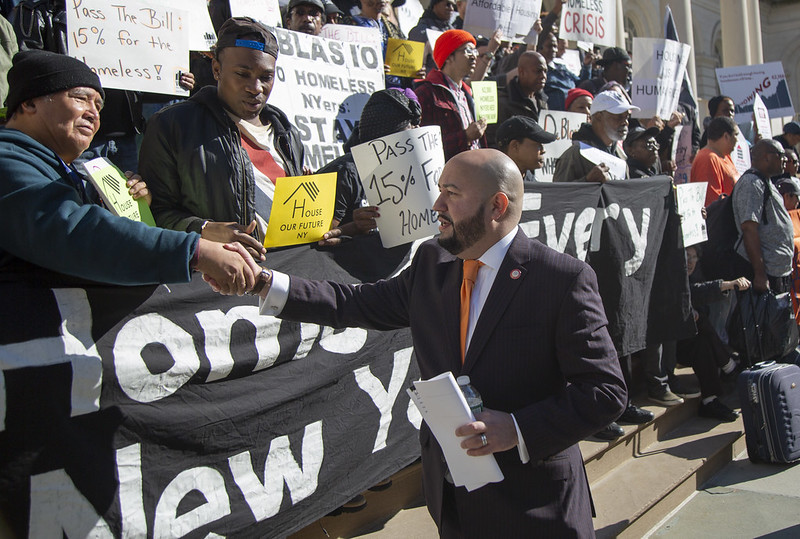Why I’m Voting No on the CUNY Staff Contract

PSC CUNY rally, with the author center back (photo: @PeteHarrisonNYC)
After over two years of negotiations, the Professional Staff Congress of the City University of New York (PSC-CUNY) and the university have reached a tentative deal on a new contract for the 30,000 faculty, adjuncts, librarians, and professional staff in our union.
The leadership of PSC-CUNY has hailed the contract as a historic deal and part of a larger stand against austerity. In particular, they sight the pay gains for adjuncts, which will increase by 71% by 2022.
As an adjunct lecturer at Baruch College, I would stand to gain from these increases, so even though I was skeptical of the contract campaign (and have participated in #7korstrike actions), I was open-minded and eager to hear my colleagues out. It’s tough to take a position against a pay raise because of my own financial insecurity. I also think the agreement secures legitimate gains. I have no doubt that they weren’t easy to get and that the executive committee worked extremely hard, creatively, and thoroughly.
But as I listened to the (at times heated) debate last Thursday night at the Delegate Assembly, I made up my mind to vote “no” on the contract.
My decision is based less on the technical merits of the contract (here’s analysis for and against) and more about the process that got us here and what it says about union power in New York City today. To me it says that it is time for generational change in union leadership.
People that I respect at the meeting and on other occasions say that our leadership has been fighting austiery and leading strikes against it in education for over 20 years; that this contract campaign is part of a longer-term strategy to defeat it. That tax cuts to billionaires makes it hard to fight.
I agree. Our leadership has been fighting for a very long time under ever tighter budgets and tougher political climates. No contract negotiation is going to result in 100% of our demands. Billionaires are making it really hard to fight back.
But the strategy simply isn’t working. Just in my case, the gains adjuncts will see fall short of our goal of $7,000 per course, which is still short of a livable wage in New York City. The overall increases for everyone won’t keep up with inflation. And it is clear that some of the new money will come from higher tuition and fewer courses for students.
To the union leadership’s credit, they acknowledge the shortfalls and vow to fight on for more in the next contract. I believe them. But it is clear that so many years of fighting against corporate power has diminished the sense of what is possible for many of our leaders. For all the rhetoric of standing against austerity, they have accepted it in practice. What’s more, they’ve done so at a time of immense opportunity for organizing in education.
Just as teachers across the country are striking and winning improvements, the leadership didn’t support a strike authorization (someone even dismissed the success of the Chicago teachers strike compared to this contract campaign). Just as a new level of energy and base-building has emerged among staff and students, the leadership claims that the membership isn’t motivated enough for mass action. Just as the left in America is finding new confidence, allies, and roads to power, PSC leadership has seemingly worked to protect establishment relationships.
I deeply value the years of experience our leadership has in this fight and the knowledge they have about the contract process. There’s no question that they know more than I do about how things work.
But I, and many members and students know that “how things work” isn’t working. The strategy to make change isn’t working. We live it everyday with higher rents, longer commutes, more work, and lower wages.
Just as importantly, I and many others believe that there are better strategies to make things work. We don’t have the time to wait around for incrementalism. We need to elevate new leaders in these spaces to carry on the fight for the future.
Fighting austerity will take mass mobilization of the working class, and not just in education or the public sector. It means building solidarity with gig economy contractors, service industry workers, and tech workers, among others. It means supporting fights for undocumented workers, sex workers, and the victims of mass incarcertaion who sit in jails or can’t find work. All of the pieces are in place and all of the parts are moving. Educators should lead the way.
Voting “no” on this contract and voting instead for a strike authorization should be the spark that unites a general strike against austerity and the billionaire class that thinks they beat another generation of workers. They are wrong.
***
Peter Harrison is a Democratic candidate for U.S. Congress (NY-12) and an adjunct lecturer at Baruch College. He lives in Stuyvesant Town. On Twitter @PeteHarrisonNYC.
***
Have an op-ed idea or submission for Gotham Gazette? Email This email address is being protected from spambots. You need JavaScript enabled to view it.
A Key Piece of the City’s New Trash Overhaul You May Not Be Aware Of

(photo: @BKROT)
For most New Yorkers, the city’s private sanitation industry is mostly out of sight, out of mind. Yet it impacts us in major ways. The industry’s old trucks chug and idle along inefficient routes, spewing pollution throughout the city each night. Once collected, the trash is dumped in communities of color, namely north Brooklyn and the south Bronx. Carters make huge profits while paying their predominantly black and brown workers horrendous wages.
Some workers have reported making as little as $80 for a 16-hour shift. Even more disturbing, some carters have created their own “unions” as a way to block legitimate labor organizing.
In 2013, I started a grassroots, organic waste micro-hauling business called BK ROT. At the time, I thought we were creating a small pilot. Six years later, I have come to realize that we’ve created an entire new sector of zero-emissions waste carters that are highly efficient at diverting large amounts of organic waste from landfills in New York City. When BK ROT started, we were the first micro-hauler in NYC, now there are seven across Brooklyn, Manhattan, Queens, and the Bronx.
BK ROT offers composting services to homes and businesses not serviced by the city’s sanitation department or by private carters. We collect organics by e-bike and process them locally as a fossil fuel-free alternative. The compost is distributed to local farms for growing food. We hire local youth at fair wages in an effort to combat the high unemployment rates in Bushwick and East New York.
From the start, we strived to be a socially-just operation. Our model was simple: good, green jobs that value workers and keep resources flowing within the community. The service fees covered our operations staff (workers ages 17-24) and leveraged our non-profit status for funding for public educational programing. We went from one worker, who started at 16 and is now 24, to a team of six. In 2013 we processed 300 pounds of food waste a month, in 2018 we did 73 tons, and in 2020 we are on track to capture 250 tons.
When New York City initiated reforms to the commercial hauling industry through the Commercial Waste Zone (CWZ) system, we saw an opportunity to integrate micro-hauling into one of the largest private sanitation systems in the world. As a humble grassroots hauling operation, we knew it would be an uphill battle.
From the jump, it felt overly ambitious to demand that our environmentally-conscious hauling service, powered by teenagers on e-bikes, be included in the city’s massive overhaul. Could we find our stride alongside the likes of multi-million-dollar companies, in an industry historically run by the mob?
We struggled to fit our grassroots solution into policy discussions alongside deeply vested interests. As a new type of hauler, policy-makers were puzzled by our innovative model and not sold on our viability. Mid-way through our advocacy, BK ROT ran out of land to process material because we only had 1,000 square feet of space and a growing list of businesses wanting our services. Our collection rates stagnated as we demanded that the draft CWZ legislation allow us to collect more food waste annually.
Demanding a higher annual collection rate would give us the room to scale up as we worked to overcome barriers such as large capital required for new technology and developing compost distribution networks. Instead of partnering with the bad actors in the carting industry just to grow our collection numbers, we doubled down on our commitment to workers, communities, and the planet.
And, we organized.
We connected with Transform, Don’t Trash, a coalition of environmental justice and labor groups who spent years exposing the private carting industry’s abhorrent practices. BK ROT also gained power by forming alliances with emerging micro-haulers, mostly led by women and people of color. Our new bonds helped forge a stronger voice.
We spent nearly devised a tiered system that defined annual hauling capacities (tonnage) for human powered e-bikes and zero emissions vehicles. We codified micro-hauling within the CWZ framework and successfully secured the ability to haul 2,600 tons of food waste per year.
The CWZ is the most progressive waste management reform in decades. The benefits will be felt citywide, but most acutely in communities of color that have suffered through environmental injustices and labor exploitation.
Our inclusion guarantees further emissions reductions in New York City, while diversifying an industry dominated by white men, as New York City’s micro-haulers are minority- and women-owned business enterprises (MWBEs).
I am incredibly proud of BK ROT, and the win for local micro-haulers. I stand with and remain deeply inspired by the Transform, Don’t Trash coalition that played a leading role in demanding sustainability and accountability in our private waste system.
The existential threat of climate change necessitates taking risks and going big on even the most unassuming ideas. Policy-makers must challenge the boundaries of what is seen as possible. Large scale climate mitigation means recognizing the power of grassroots groups and bringing them directly to the policy table.
***
Sandy Nurse is the Founder and Former Executive Director of BK ROT and a candidate for State Assembly in Brooklyn’s District 54. On Twitter @NurseForNY & @BKROT.
***
Have an op-ed idea or submission for Gotham Gazette? Email This email address is being protected from spambots. You need JavaScript enabled to view it.
A Well-Meaning But Misguided Housing Proposal

Council Member Salamanca (photo: John McCarten/City Council)
A year ago, a homeless woman confronted Mayor de Blasio during his gym workout in Park Slope to ask why the city doesn’t set aside more apartments for homeless people. The incident and a video of it in which the mayor refused to talk with the woman, Nathylin Flowers Adesegun, were widely reported. A few weeks later, City Council Member Rafael Salamanca of the Bronx introduced legislation that would require any rental housing project receiving taxpayer subsidies such as tax abatements, loans, tax credits or reduced-cost land to set aside 15% of its units for people living in the city’s shelters.
The mayor’s comments about the proposed legislation were on target. He said:
“I think that the [current] affordable housing plan works for the people of the city because it is for everyone. It is meant to reach working-class people, middle-class people, low-income people,” and, “I don’t want to send a message that the only folks who can get affordable housing are folks who end up in shelter. I think that’s wrong for everyone.”
Now, almost exactly a year later, Salamanca has re-introduced the same bill but the mayor’s response has been quite different -- he says he is sure he can reach a deal with Council Speaker Corey Johnson.
The mayor was right a year ago and there is no reason to change positions now. His apparent disinterest in or distaste for conflict with the Council cannot be allowed to lead to bad policy that will impede what has been a successful program to build and preserve affordable housing for needy New Yorkers at a variety of income levels.
In 2014 the de Blasio administration issued Housing NY, a ten-year plan to build and preserve a total of 200,000 units of housing in the five boroughs. An important principle of the plan was that the apartments developed would be affordable to families at an array of income levels, from those of extremely low-income, defined as below $25,000 a year for a family of four, to those of middle-income, families of four earning $100,000-138,000 a year, and others in between. The plan projected the distribution of units developed at 20% (40,000) for extremely low- and very low-income households, 58% (116,000) for low-income households, and 22% for moderate- and middle-income households (44,000).
In 2017 Housing NY 2.0 modified the administration’s already-ambitious goals by accelerating its plan, extending it two years, and adding an additional 100,000 units to be preserved or created by 2026. The new targets increased the number of extremely low- and low-income households to be housed to 25% of the total.
Providing affordable housing to New Yorkers at all low- to middle-income levels is important to maintaining a thriving economy and a diverse, vibrant city. As a recent report from the Department of City Planning shows, the city’s supply of jobs far exceeds its supply of housing and we need to generate more places for workers to live.
It is very expensive to build and maintain units for extremely low-income households (approximately $150,000- $200,000 in city capital subsidy per unit for construction, plus ongoing rental assistance) so the rents at higher income levels are necessary to make developments economically viable. The situation is not helped by the fact that the City Council keeps piling on requirements -- like the just-added prevailing wage requirement -- that are not only costly, but deter developers (both for- and non-profit) from wanting to even do deals with the city. It also must be acknowledged that many families in the shelter system need a variety of on-site services in addition to housing, services that private-sector buildings do not provide.
Reasonable people can debate the shortcomings and details of Housing NY, for example, the inclusion of thousands of units in Stuyvesant Town as “preserved” but there is no denying that it has been an ambitious effort that has thus far leveraged over $14 billion in city capital commitments and generated 135,000 units of urgently needed housing.
City officials need the flexibility to design each project based on its overall size, location, and cost; they should not be constrained by arbitrary apartment allocation requirements to particular income levels or types of tenants.
Mayor de Blasio needs no prodding to devote priority and resources to homeless individuals and families. His annual budget provides more than $3 billion a year for shelters, rent assistance, legal assistance, and other homelessness prevention programs, re-housing efforts, and related social services.
So far, about 11% of the units generated by Housing NY have gone to homeless households. Moreover, in 2016 NYCHA started giving preference to homeless families and over the past three years, nearly half of all tenants placed in NYCHA units -- 6,400 -- have been formerly homeless. Another 4,400 homeless families have received Section 8 rental assistance through NYCHA in the same time period.
The City Council should not create a one-size-fits-all set-aside that would tie the hands of the Mayor, Deputy Mayor for Housing, and other city officials who are trying to spur as much housing construction as possible and who are already motivated to create units for homeless families without compulsion.
If the 15% homeless requirement is in addition to the 25% proportion of units Housing NY 2.0 already requires for extremely low-income units, it will make some projects so costly that they will not be built. If the homeless allocation is instead made part of the total number of project units allocated to low-income families, it will take much-needed units out of the pool available to the thousands of other families earning less than $25,000 a year who also need decent and affordable places to live in New York City. Neither is acceptable.
The Council’s focus should be on streamlining the process for project approval and creating more new affordable housing across the income spectrum, not counterproductive requirements and virtue posturing.
***
Carol Kellermann was president of Citizens Budget Commission from 2008 through 2018.
***
Have an op-ed idea or submission for Gotham Gazette? Email This email address is being protected from spambots. You need JavaScript enabled to view it.




